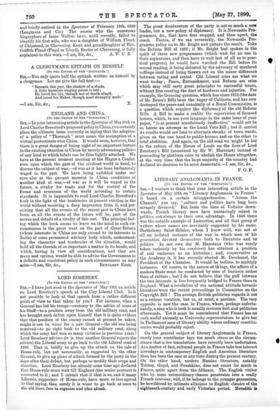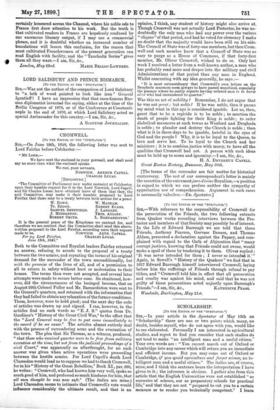LITERARY ANGLOMANIA IN FRANCE.
[To THE EDITOR OF THE "SPECTATOR."] SI14—I venture to think that your interesting article in the Spectator of May 20th on "Literary Anglomania in France" is based on a certain misapprehension. "Across the Channel," you say, "culture and politics have long been savagely divorced." But from the time of Voltaire down- wards, French literary men have unceasingly mixed in politics, not always to their own advantage. In 1848 there was the notable example of Lamartine, and all that group of writers whose names are inevitably suggested by his name. Barthelemy Saint-Hilaire, whom I knew well, was not at all an isolated instance of the way in which men of his generation devoted themselves both to literature and to politics. In our own day M. Hanotaux (who was surely taken seriously by his confreres) has attained a position of real eminence as an historian ; and, conservative as the Academy is, it has recently elected M. Deschanel, the President of the Chamber. It would be tedious to multiply instances. Of course, in the nature of things, the affairs of a modern State must be conducted by men of business rather than of culture ; but I do not believe that the gulf between the two interests is less frequently bridged in France than in England. What a revelation of our national attitude towards literature were the recent proceedings in Committee on the Copyright Bill ! The average British politician regards it not as a serious vocation, but as, at most, a pastime. The very opposite is now the case in France, where, perhaps unfortu- nately, a man who is both is usually icrivain first and politician afterwards. Yet it must be remembered that France has no such useful anomaly as University representation to give her in Parliament men of literary ability whom ordinary constitu- encies would probably reject.
On the general subject of literary Anglomania in France, surely your contributor lays too much stress on the circum- stance that a few translations have recently been undertaken. As a matter of fact, cultured people in France take less interest nowadays in contemporary English and American literature than has been the ease at any time during the present century. On the other hand, modern Russian literature, notably Tolstoy, Gogol, and Poushkine, does not count for much in France, quite apart from the Alliance. The English visitor who by some extraordinary chance penetrates into a really French interieur, will, if he belongs to the younger generation, be bewildered by intimate allusions to English classics of the eighteenth-century and early Victorian period. Meredith is certainly honoured across the Channel, where his noble ode to France first drew attention to his work. But the truth is that cultivated readers in France are hopelessly confused by our enormous literary output, if I may use a commercial phrase, and it is doubtful whether an increased number of translations will lessen this confusion, for the reason that most cultivated Frenchwomen of the present generation can read English with facility, and the " Tauchnitz Series" gives • them all they want.—I am, Sir, &c.,







































 Previous page
Previous page